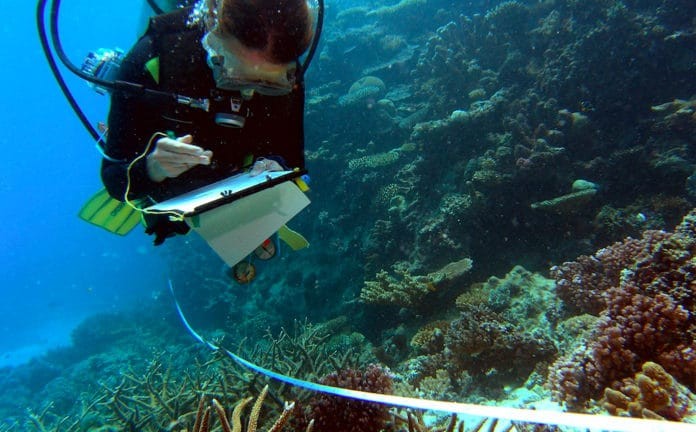Climate change and ocean warming threaten coral reefs globally with more frequent and deadly coral bleaching events. But a new study, using 20 years of Reef Check data, finds that corals now can withstand higher temperatures before bleaching than they could a decade ago.
The study was published March 20, 2019 in the journal Nature Communications. The study team included Ph.D. student Shannon Sully and professor Rob van Woesik at the Florida Institute of Technology, Deron Burkepile and Mary Donovan at the University of California Santa Barbara, and Reef Check founder Gregor Hodgson.
The team analyzed Reef Check data from more than 3,300 sites in 81 countries to examine global coral bleaching patterns in relation to water temperature. They found that, compared to the previous decade, corals now can withstand 0.5 degrees Celsius (about 1 degree Fahrenheit) higher temperature before starting to bleach.
According to Hodgson, this is most likely due to adaptation of both the corals and the microscopic algae that live in their tissues.
Hodgson said:
“After watching a large section of the Great Barrier Reef bleach and some of it die over the past few years, it is a bit of good news that we may have a little more time to solve global warming.”
Florida Tech’s Shannon Sully said:
“We found that it took higher temperatures to bleach corals this past decade than it did 20 years ago.”
The authors suggest that the higher temperature threshold for bleaching in this decade is likely a consequence of the decline in temperature-sensitive corals during previous bleaching events, and that the remaining corals now are adapted to higher thermal stress.
The team also found that bleaching was significantly less common on reefs near the Equator despite similar thermal stress levels, contradicting expectations.
However, Rob van Woesik said many questions remain:
“We are uncertain why equatorial reefs are more tolerant of recent temperature stress, but we do know that we must protect these equatorial reefs – and reefs everywhere – from other disturbances, lest we lose coral reefs that protect coastal inhabitants from storm waves and help feed millions of people worldwide.”
Reef Check Executive Director Jan Freiwald was glad to see Reef Check’s data put to good use:
“Global warming is now the biggest threat to the survival of coral reefs – and humans. Reef Check’s citizen scientist divers work hard to survey reefs all over the world to provide the data we need to make effective management decisions on a changing planet and reverse the trend of coral loss.”
The article is available here.

